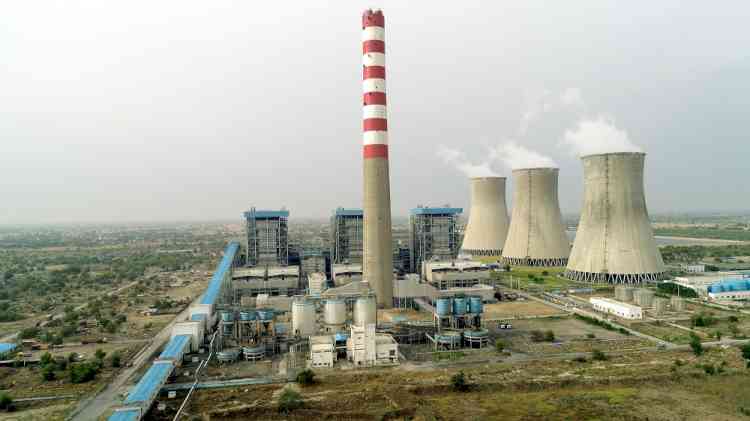Vedanta Power Supports Set-up of Punjab’s Largest Torrefied Biomass Plant to Fight Stubble Burning
Talwandi Sabo Power Limited (TSPL), a Vedanta Power company and North India’s largest private thermal power producer, has led to the establishment of Punjab’s biggest biomass manufacturing facility, produced in the form of torrefied bio-pellets, near its 1980 MW thermal plant in Mansa.

Mansa, April 28, 2025: Talwandi Sabo Power Limited (TSPL), a Vedanta Power company and North India’s largest private thermal power producer, has led to the establishment of Punjab’s biggest biomass manufacturing facility, produced in the form of torrefied bio-pellets, near its 1980 MW thermal plant in Mansa.
Torrefied biomass is a high-grade, solid biofuel made from biomass or agricultural residue through a thermochemical process. The end-product is a high-quality biofuel with far greater energy density than the original feedstock. TSPL is a highly advanced, supercritical thermal power plant and can only use high-grade biofuels such as torrefied biomass. With a capacity of 500 tons per day, the new biomass plant will convert agricultural stubble into clean-burning, carbon-neutral bio-pellets, offering a sustainable alternative to coal.
Aligned with Vedanta’s decarbonization vision to be Net Zero by 2050, the newly developed facilities were inaugurated by Prof. (Dr.) Adarsh Pal Vig, Chairman of the Punjab Pollution Control Board (PPCB), as Chief Guest, alongside Pankaj Sharma, Chief Operating Officer, TSPL. Other senior officials from PPCB- Member Secretary GS Majithia, Chief Environmental Engineer Rakesh Kumar Nayyar, Senior Environmental Engineer Samita, and Environmental Engineer Ramandeep Singh, also graced the ceremony.
Punjab generates nearly 15-20 million tons of crop stubble (parali) annually. Much of this is traditionally burned in the fields, contributing to severe seasonal air pollution across North India. With this use of biomass in its fuel mix, TSPL will decrease its carbon footprint in two ways. First, TSPL has procured over 8 lakh tons of agricultural stubble in the paddy season, for conversion into approximately 6.4 lakh tons of torrefied bio-pellets at this new facility. Secondly, the company will reduce 5% use of coal daily by replacing a portion of coal with this carbon-neutral alternative. These two pathways together, will potentially avert nearly 2.6 million tons of CO₂ emissions.
Additionally, TSPL co-fires 450 tons of torrefied biomass daily procured from open markets and made from crop stubble. This is creating an ecosystem for farmers to divert their crop stubble into remunerative avenues, rather than burning it and causing massive air pollution.
The torrefied bio-pellets are produced from agricultural stubble sourced through TSPL’s extensive stubble management campaign. The new facility, part of TSPL’s broader stubble management drive, aims to curb open-field burning, improve air quality, and accelerate the state’s clean energy transition, positioning the company as a key player in sustainable biomass-based solutions.
Emphasizing the role of industrial stewardship in driving environmental innovation, Dr. Adarsh Pal Vig, Chairman of PPCB, commented, “The commissioning of these biomass plants reflects the kind of collaborative innovation required to improve air quality across Punjab and neighbouring states. By utilizing agricultural stubble in the form of torrefied bio-pellets, TSPL is significantly reducing coal consumption and advancing environmental compliance in thermal power generation. Their leadership in facilitating this development underscores the impact of proactive industrial action in driving environmental transformation.”
G.S. Majithia, Member Secretary at PPCB, who toured the new facility, remarked, “TSPL’s facilitation of Punjab’s largest torrefied bio-pellets plant is a commendable step towards sustainable industrial development. Initiatives like these are instrumental in fostering environmentally responsible growth and setting a benchmark for green innovation across the region.”
Rajinder Singh Ahuja, CEO, Vedanta Power, said, “As one of India’s largest private power generators, this initiative is aligned with our commitment to support the nation’s clean energy roadmap. Despite early-stage challenges including technology access, gaps in infrastructure, and limited bio-pellet availability, our focus on enabling a greener transition never wavered. This innovative solution will help mitigate Punjab’s stubble burning and lead towards a sustainable future. These plants complement our existing biofuel efforts and underscore our long-term vision for a more sustainable and future-ready power sector.”
TSPL will continue its biomass co-firing initiative, contributing directly to the decarbonization of thermal power generation. The newly developed biomass facilities will gradually ramp up production to ensure steady supply to TSPL in increasing volumes.
The development of the new facilities is being recognized as a model for how industry-led facilitation, sustainable innovation, and regulatory alignment can work in tandem, within conventional energy systems, to integrate sustainable practices and accelerate clean energy adoption.


 City Air News
City Air News 










